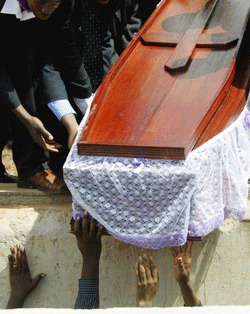By the second April 10, as the African Synod opened in Rome--the official title for this meeting is 'The Special Assembly for Africa of the Synod of Bishops"--details had just reached the outside world of the slaughter in Rwanda. Among those killed in the wave of "ethnic cleansing" were 19 Africans gathered at the Jesuits' Christus Centre in the Rwandan capital, Kigali: nine young Rwandan sis¬ters of the congregation "Vita et Pax"; the Rwandan cook; a Rwandan social worker who had apparently sought refuge there; five Rwandan diocesan priests meeting at the center, and three Rwandan Jesuit priests.
At Jesuit headquarters in Rome, African bishops who had arrived for the synod joined the Jesuits' superior general and young African Jesuits studying in Rome to pray for all the victims of ethnic violence in central Africa and for the restoration of justice and peace. The Jesuits who died were remembered precisely for their work at the Christus Centre, which was dedicated to ethnic reconciliation and the protection of the vulnerable.
The term "ethnic cleansing," as we know all too well from former Yugoslavia, is a European coinage. There is nothing specially African about either the euphemism or the reality. As in the Balkans, so in Rwanda, efforts to understand what is happening fall back on terms like "ancient hatreds" and "historic grievances," but there is nothing predestined or inevitable about it. As in the Balkans, so too in Rwanda, unscrupulous and weak-minded politicians--in this case, not hard-line Serbs but hard-line Hutus--have seized upon an unsettled moment to grab more power for themselves and their party by killing off political opponents, mostly Tutsis, but also Hutus working for political reconciliation. Waving the ethnic banner, as in the Balkans, the hard-liners have unleashed ignorant men to massacre the "others," and by
horrid irony this dirty work is called "cleansing."
Two weeks ago, America's 85th-anniversary issue featured the African Synod in two articles, one of them an interview with African theologian Lamin Sanneh, who asks Western Christians to feel for Christians worldwide a kinship transcending idols of national ideology and culture. It is such a kinship that America professes here by publishing in miniature the life stories of three of our brother Jesuits murdered in Rwanda. It is too easy, amid all the blood and death--by April 10 it was thought some 20,000 had perished in and around Kigali--to see just the heaped up bodies and not the faces of those who shared their love of Christ with us. Nor do we mean, by publishing these, to overlook the personal stories of the others, the women religious for instance, who also died at the Christus Centre, but we could quickly get detailed information on the Jesuits:
Chrysologus Mahame, 67, a Tutsi and the first Rwandan Jesuit, had served as regional superior, taught in the seminary and, at the time of his death, was superior of the Jesuit house of studies in Butare. By character and education, he appealed to both Hutus and Tutsis, though his efforts to reconcile the two groups and to serve as an ecumenical and ethnic bridge--by conducting retreats, workshops and continuing-formation sessions at the Christus Centre--earned him enemies. Like Jesuits killed in Latin America, he was unloved by those who had sold out to one or the other political side though, ironically, he was reaching out to both sides.
Patrick Gahizi, 48, was a Tutsi whose family had been exiled from Rwanda into Burundi, where he grew up. He graduated from the University of Bujumbura and entered the Society of Jesus in Burundi. He studied philosophy in Kinshasha, Zaire, and theology at the Gregorian University in Rome. He had served as principal of the high school at Gisenyi, Rwanda, and, at the time of his death, was regional superior of Rwanda--a role that fitted him because his background made him acceptable to Hutus and Tutsis, in both Rwanda and Burundi. Destined for higher office, he was not, as a friend clarifies, "political" in any negative sense.
Innocent Rutagambwa, 46, was of mixed Tutsi-Hutu parentage. He had just fmished a term as assistant to the Jesuit provincial superior in Zaire. Unlike Chrysologus and Patrick, he was not obviously a leader, being much more low-key by temperament. He had taught in high school, but not too happily, as he was not notably successful in coping with the antics of high schoolers. His preferred metier was spiritual direction, and in that he was skilled and discreet. His baptismal name suited him.
Indeed, the first names of these African Christians insist on their kinship with us in the West. "Patrick" is heard around the world, of course, and who besides third world Catholics now take such resolutely Roman names as "Chrysologus" and "Innocent"?
American Jesuits are proud to call them brothers. They died as they lived, trying to overcome the sort of division that took their lives, affording protection to the vulnerable even when it cost them their lives. Father Richard John Neuhaus penned a throw-away line in his journal First Things this month opining that the Society of Jesus "as distinct from many of its members" had become a "net liability" for the Catholic Church. Luckily for us Jesuits, who no doubt have many faults, the Society of Jesus is not distinct from its members, and we wish Father Neuhaus had got to know Chrysologus, Patrick and Innocent and to visit the Christus Centre.








